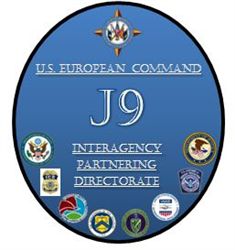J9 – Interagency Partnering
Print-ready fact-sheet
The J9 embodies a “whole of society” approach, bringing in a wide range of perspectives by integrating U.S. and nongovernmental agencies, academic institutions, international organizations, and private-sector partners to better execute EUCOM operations.
The directorate focuses on building and strengthening sustainable partnerships with interested organizations to ensure regional security and stability. Several U.S. government agency partners provide onsite representatives, to include:
- Department of State
- Department of Treasury
- Department of Energy
- Drug Enforcement Administration
- Customs and Border Protection
- U.S. Agency for International Development
- Immigration and Customs Enforcement
- Department of Justice
- Federal Bureau of Investigation
Additionally, EUCOM staff officers work alongside Interagency partners in the national capitol region. Interagency partners are integral members of the EUCOM team, representing their agencies while also working with U.S. military planners and staff to ensure close coordination in activities in EUCOM’s theater.
The staff also reaches out to entities outside of the U.S. Government, including academia, think tanks, non-governmental organizations, private businesses, and international organizations. These organizations offer EUCOM valuable viewpoints and capabilities so it can work together to strengthen regional security and stability.
Contact
Director: Mr. Michael C. Ryan (.pdf, 180 KB)
Address: HQ USEUCOM/ECJ9, Unit 30400, APO AE 09131
Comm: +49 (0)711-680-6558/4940
DSN: 314-430-6558
Fax: +49 (0)711-680-9307
E-mail: ecj9-xo@eucom.mil







EUCOM Social Media Links